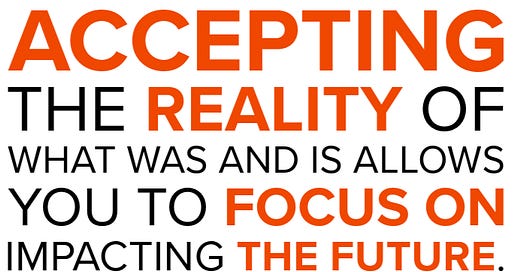Acceptance
Accepting the reality of what was and is allows you to focus on impacting the future. That is your way through.
A look at acceptance in Buddhism, Christianity, and modern psychology. Three of the frames I use in developing my understanding of spirituality.
Acceptance In Buddhism
Acceptance is a central practice in Buddhism that involves being at peace with all conditions, both good and bad, in one's life and in the world. ****It's about being fully present and observing the moment-to-moment experience without resistance. What we resist persists. Our resistance is a form of clinging.
A core element of acceptance is not clinging to positive experiences or resisting negative ones, recognizing that all things are impermanent and subject to change.
Meditation and other mindfulness techniques cultivate present-moment awareness, allowing one to observe thoughts and feelings without judgment and accept them as they arise.
Acceptance In Christianity
Acceptance is a core principle in Christianity that involves embracing yourself, embracing others as they are, and offering love, forgiveness, and grace. It reflects God's love for humanity and is essential for healthy relationships and unity within the Christian community. It also calls for radical acceptance of life by trusting God’s plan.
There are many tools for developing acceptance offered by the Christian faith. Recalling God’s acceptance and grace for you despite your imperfections reminds you that you have been accepted. Taking the focus off others and putting it on yourself to look at what you are being called to do shifts you toward radical acceptance. Praying for qualities like compassion, forgiveness, humility, empathy, patience, unity, and wisdom builds the capacity to do the work, even when it’s hard.
Acceptance In Modern Psychology
Acceptance is the final stage of the Kübler-Ross's grief cycle. This is not necessarily a happy or peaceful stage, but it signifies a coming to terms with the loss and an ability to move forward. It involves acknowledging the reality of the situation and adapting to a new normal.
Getting there looks different for everyone, but knowing the four previous stages can help you move through them as best as possible. The cycle is highly dependent on the person and the situation. Your mileage may vary. I also encourage you to swap out the word grief for any negative feeling or fact you may be facing. It doesn’t have to be that heavy. The concepts are still helpful.



